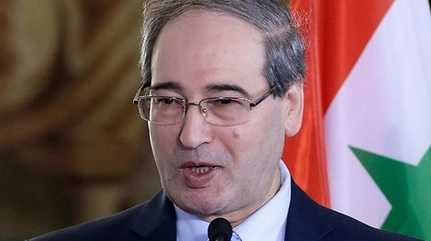
08 Feb 2023; MEMO: Syrian Foreign Minister Faisal Mekdad has criticised western sanctions which he said have "exacerbated the tragedy and catastrophe" of the devastating earthquake which struck parts of Syria and neighbouring Turkiye in the early hours of Monday morning.
"The sanctions on Syria have made the disaster all the worse," Mekdad told Lebanon's Al-Mayadeen. "The state is following up on the mobilisation of aid domestically and abroad, and President Bashar Al-Assad has requested that all of the state's capabilities be employed in search and rescue operations."
The foreign minister noted that several countries have provided aid to Syria, including some Arab states, but stressed that more aid is needed. "Humanitarian aid is not subject to sanctions in accordance with international laws, so this is not an excuse," he explained, referencing the EU which has been reluctant to send aid due to its opposition to the Syrian government.
"The US sanctions are prohibiting Syria from accessing anything, including medicine," added Syria's top diplomat. "Western countries provided millions of dollars to terrorism and failed, and now they dream of rapprochement with Syria. Syria is steadfast in the face of terrorism, and it is suffering as a result of the earthquake, as thousands need relief."
AP quoted Aron Lund, a fellow with US-based think tank Century International who researches Syria, as saying that, "A key issue complicating the dispersal of aid is the war and the way the aid response is split between rebel areas and Damascus."
A non-resident fellow at the Washington-based Middle East Institute, Emma Beals, said that the presence of designated terrorist groups, who are in control of most opposition-held territories, "limits the kinds of aid many donors are prepared to supply to the area."
READ: Germany calls to allow entry of aid to opposition areas in Syria
Yesterday, the Syrian Arab Red Crescent called on the US and the EU to lift economic sanctions against Syria to help the relief efforts.
Observers on social media have noted that air traffic has largely been directed to Turkiye for humanitarian aid while Syria has been effectively "abandoned" by much of the international community.
Nevertheless, humanitarian aid flights and rescuers have arrived from Syria's key allies Iran and Russia, as well as Algeria, India, Iraq, Jordan, Tunisia and the UAE. Flights landed at airports in government-held territories. Lebanon's Hezbollah movement has also sent aid convoys to earthquake-affected areas in Syria, while the Sultanate of Oman has established an air bridge to transport relief and medical aid to the country.
The combined death toll of the earthquake in Turkiye and Syria has now reportedly exceeded 11,200.




